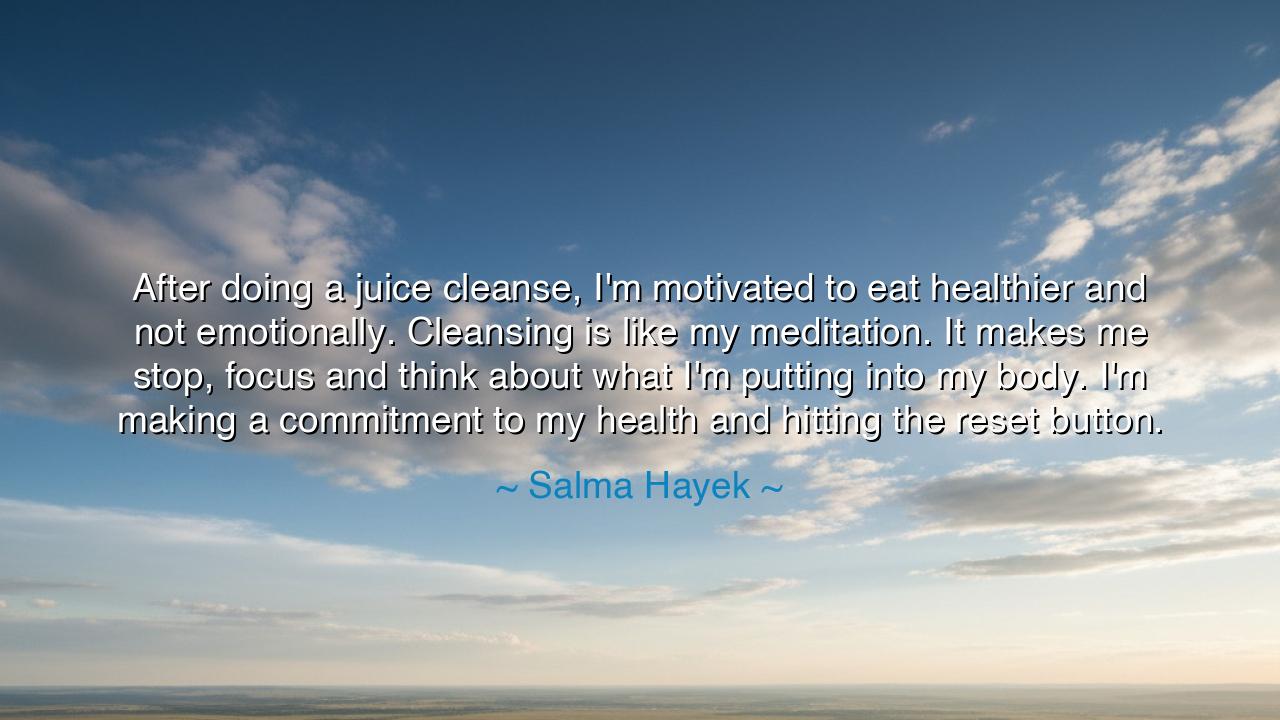
After doing a juice cleanse, I'm motivated to eat healthier and
After doing a juice cleanse, I'm motivated to eat healthier and not emotionally. Cleansing is like my meditation. It makes me stop, focus and think about what I'm putting into my body. I'm making a commitment to my health and hitting the reset button.






In the gentle yet powerful words of Salma Hayek, the artist and seeker of balance, there lies a wisdom both modern and eternal: “After doing a juice cleanse, I'm motivated to eat healthier and not emotionally. Cleansing is like my meditation. It makes me stop, focus and think about what I'm putting into my body. I'm making a commitment to my health and hitting the reset button.” These words, though spoken in the language of our time, carry the ancient spirit of purification, of renewal, of the sacred bond between the body and the soul. For she does not speak merely of food or fasting, but of the act of remembering oneself—of pausing the noise of the world to listen once more to the whisper of life within.
Since the dawn of civilization, the wise have known the power of cleansing. The priests of Egypt fasted before entering the temples; the monks of the East purified their bodies with herbs and silence; the philosophers of Greece refrained from indulgence to clear their minds for thought. All understood that when the body is burdened, the spirit too grows heavy. To cleanse is to cast away not only the toxins of the flesh but the shadows of the heart. Salma Hayek, in her reflection, touches this timeless current: the understanding that the path to health begins with awareness—with the decision to stop, to focus, and to renew.
There is an ancient story of Pythagoras, the philosopher who sought wisdom in purity. Before his students could study with him, he required them to fast and abstain from meat, saying that only those who could master their appetites could master their thoughts. Many turned away, unwilling to give up pleasure for clarity, but those who remained found their minds sharper, their hearts calmer, their spirits attuned to the harmony of the universe. In this, as in Hayek’s practice, lies a shared truth: that through discipline and stillness, we remember the sacredness of the vessel that carries our soul—the body itself.
When Hayek speaks of not eating emotionally, she speaks of liberation. For to eat emotionally is to let pain rule the body, to feed the void within rather than nourish life. But to eat with mindfulness—to see food as medicine, and eating as communion—is to reclaim one’s sovereignty. Her juice cleanse is not a ritual of vanity but of remembrance, a modern echo of ancient fasting: to break the bond between impulse and identity, and to rediscover intention in every act. She reminds us that food is not merely fuel, but a reflection of our relationship with the self.
To hit the reset button is a phrase of the modern tongue, but it carries an ageless yearning. It is the same impulse that led hermits to the mountains, that called pilgrims to the desert, that inspired sages to retreat from the world for a season of silence. The reset is the sacred pause—the breath before transformation. In a world of endless motion, it is an act of courage to stop. It is in this stopping that the spirit finds clarity, and the heart remembers its direction. Hayek’s ritual, humble though it may seem, is a defiance against the chaos of consumption—a declaration that she will live with intention, not by reflex.
We might recall the story of Ashoka, the Indian emperor who, after years of conquest, was haunted by the suffering he caused. He withdrew from the luxuries of his palace, sought solitude, and through reflection and cleansing of spirit, emerged transformed—a ruler of compassion instead of conquest. What he did for his soul, Hayek does for her body, and what she does for her body, we all must learn to do for our lives: to cleanse, to reflect, to begin anew.
The lesson is clear: health is not a gift bestowed but a choice renewed each day. To commit to one’s health is to honor the divine in oneself. To cleanse is not merely to remove impurities but to make space for the sacred—to empty the vessel so that it may again be filled with life, gratitude, and clarity. Whether through fasting, meditation, stillness, or simply breathing with awareness, each of us can reclaim our center amid the world’s noise.
Therefore, my friends, learn from the wisdom of Salma Hayek: take time to pause. Reflect on what you place into your body, your mind, your heart. Let your cleansing—in whatever form it takes—be your meditation. Step away from haste, from indulgence, from thoughtless consumption, and in that stillness, reset your spirit. For the one who knows how to begin anew each day never grows weary, and the one who honors their body as a temple walks always in the light of balance and peace.






AAdministratorAdministrator
Welcome, honored guests. Please leave a comment, we will respond soon